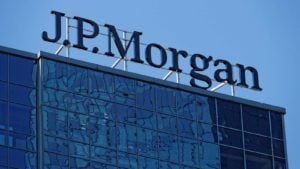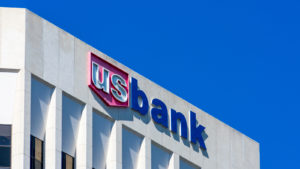In March, I discussed three reasons why most investors should never buy bank stocks. Banks’ balance sheets and income statements need to be simpler for most do-it-yourself investors to understand. However, if you must invest in the banking industry, narrowing your focus to dividend aristocrat bank stocks makes sense.
Dividend aristocrats are S&P 500 companies that have increased their annual dividend for 25 or more consecutive years. Currently, only 68 companies make the cut. But unfortunately, no bank stocks are on the list due to the 2008 financial crisis. There are asset managers and insurance companies, but no banks.
That said, some have increased their dividends over the past decade. These are the ones that investors ought to focus on. Should we not go through another financial crisis over the next 15 years, bank stocks could return to dividend aristocrat territory. These three are on their way, and have increased their annual payout over the past 10 years.
JPMorgan Chase (JPM)

Source: Shutterstock
JPMorgan Chase (NYSE:JPM) has increased its dividend by 159% over the past decade, from $1.58 in 2014 to $4.10 in 2023, a compound annual growth rate (CAGR) of 10%. Over the past decade, its payout ratio hit a high of 40.5% in 2020 and a low of 24.7% in 2021.
The bank’s CEO, Jamie Dimon, praised some of Donald Trump’s economic policies at the World Economic Forum in Switzerland in January. “Take a step back, be honest. He was kind of right about Nato, kind of right on immigration. He grew the economy quite well. Trade tax reform worked. He was right about some of China,” Financial Times reported Dimon’s comments.
Although Dimon has said he’s a Democrat, it’s clear that he wants what’s best for himself and his bank. If that means easier banking regulations from a Republican administration, it’s easy to see why he would say this. It’s in his best interests.
However, regardless of which party is in power, Dimon will still run America’s largest bank by assets, with $3.4 trillion as of April 2, 2024. If there is a “too big to fail” American bank, JPMorgan is it. It yields a respectable 2.31% and could soon be back on the list of dividend aristocrat bank stocks.
Bank of America (BAC)

Source: Tero Vesalainen / Shutterstock.com
With $2.54 trillion in assets, Bank of America (NYSE:BAC) is the second-largest U.S. bank. Although it might be smaller than JPM, its dividend payout isn’t half bad.
It has increased its dividend by 667% over the past decade from 12 cents in 2014 to 92 cents in 2023, a CAGR of 22.6%. Over the past decade, its payout ratio hit a high of 38.5% in 2020 and a low of 20.69% in 2018.
Bank of America is Berkshire Hathaway’s (NYSE:BRK-A, NYSE:BRK-B) second-largest holding in its $371 billion equity portfolio. The holding company owns 13.1% of the bank, a stake valued at $38.7 billion. Only it and Apple (NASDAQ:AAPL) account for more than 10% of Berkshire’s portfolio.
Buffett’s next-largest bank stock is Capital One Financial (NYSE:COF), which accounts for just 0.5% of Berkshire’s portfolio, with a stake of 3.3% in the credit card provider. Capital One is currently attempting to acquire Discover Financial Services (NYSE:DFS) for $35 billion. Discover is one of America’s largest credit card companies. There is plenty of opposition to the transaction because of what it might do to fees while ratcheting up the risk in America’s financial services industry.
Buffett loves dividends. Based on its annual dividend payout of 96 cents a share, Berkshire will receive approximately $992 million in dividends from its BAC investment in 2024.
U.S. Bancorp (USB)

Source: Michael Vi / Shutterstock.com
U.S. Bancorp (NYSE:USB) has increased its dividend by 99% over the past decade from 97 cents in 2014 to $1.93 in 2023, a CAGR of 7.1%. Over the past decade, its payout ratio hit a high of 59.02% in 2023 and a low of 31.33% in 2014.
It’s the weakest of the three banks on this list, with assets of $650.7 billion as of April 2, 2024, less than half the assets of Citigroup (NYSE:C), the fourth-largest by assets. Compared to both JPM and BAC, whose stocks are up 15.6% and 10%, respectively, year-to-date (YTD), it’s significantly underperforming, down 1.5% for the year.
But while it’s the ugly duckling of the three on this list, now might be a good time to buy its stock. On March 28, HSBC analysts upgraded USB stock to “Buy” from “Hold,” while increasing their target price by $6 to $53, 20% higher than where it’s currently trading. HSBC expects the bank’s profitability to improve in 2025, leading to an already attractive tangible return on common equity (ROTCE).
Part of the issue with USB is that it’s in no-man’s land, caught between being “too big to fail” and the smaller regional banks. In 2024, due to the black cloud created by New York Community Bancorp’s (NYSE:NYCB) commercial loan losses, regional bank stocks suffered greatly. But yielding 4.53%, USB does have one of the highest yields amongst America’s largest banks.
On the date of publication, Will Ashworth did not have (either directly or indirectly) any positions in the securities mentioned in this article. The opinions expressed in this article are those of the writer, subject to the InvestorPlace.com Publishing Guidelines.

